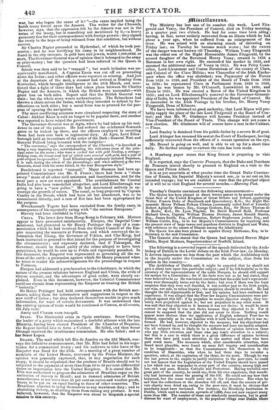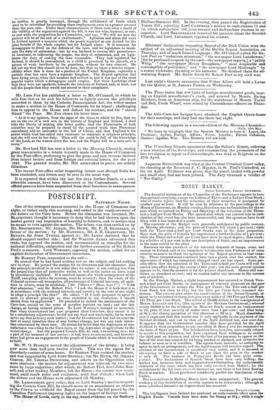Atisallaneous.
The Ministry has lost one of its number this week. Lord Fitz- gerald and Vesey, the President of Control, died on Friday morning, at a quarter past two o'clock. He had for some time been ailing ; having, in fact, never entirely recovered from an illness which be had about a year ago, when he suffered from an enlargement of the liver. He was seized with an alarming attack of shivering on Friday last ; on Tuesday he became much worse ; but the extent of the danger was not known till Thursday. William Vesey Fitzgerald was the eldest son of the Right Honourable James Fitzgerald, by the second daughter of the Reverend Henry Vesey, created in 1826 a Baroness in her own right. He succeeded his mother in 1832, and assumed the additional name of Vesey in 1815. He was Privy Coun- cillor, Lord-Lieutenant and Custos Rotulornm of the county of Clare, and Colonel of the Clare Militia ; was Chancellor of the Irish Exche- quer when the office was abolished; was Paymaster of the Forces from 1826 to 1828, and President of the Board of Trade from 1828 to 1830 ; he represented Clare in Parliament from 1820 to 1826, when he was beaten by Mr. O'Connell, Lostwithiel in 1830, and Ennis in 1831. He was created a Baron of the United Kingdom in 1835 ; and on Lord Ellenborough's removal to the Governor-General- ship of India, he was appointed President of the Board of Control. He is succeeded in the Irish Peerage by his brother, Dr. Henry Vesey Fitzgerald, Dean of Kilmore.
We have been informed on good authority, that Lord Ripon will pro- bably supply the place of the late Lord Fitzgerald at the Board of Con- trol; and that Mr. W. Gladstone will become President instead of Vice-President of the Board of Trade. This change will not cause a new election. Mr. Gladstone will of course have a seat in the Cabinet. —Times.
Lord Stanley is detained from his public defies by a severe fit of gout. Lord Abinger has resumed his seat at the Court of Exchequer, having sufficiently recovered from the effects of a recent operation on the eye. Mr. Brunel is going on well, and is able to sit up for a short time daily. No further attempt to extract the coin has been made.
A Hamburg paper states that King Ernest is preparing to visit England.
It is reported, says the Courrier Franyais, that the Duke and Dutchess de Nemours intend shortly to proceed to England on a visit to the Queen and Prince Albert.
It is as yet uncertain at what precise time the Grand Duke Constan- tine of Russia, his Imperial Majesty's second son, as to set out on his intended voyage; but we are enabled to state that the principal object of it will be to visit England for several months.—Morning Post.
Tuesday's Gazette contained the following announcement— The Queen has been pleased to direct letters patent to be passed under the Great Seal of the United Kingdom of Great Britain and Ireland, appointing Walter Francis Duke of Buccleuch and Queensberry, LG., the Right Ho- nourable Henry Pelham Pelham Clinton (commonly called Earl of Lincoln) Robert Aglionby Slaney, Esq., George Graham, Esq., Sir Henry Thomas de la Beebe, Knt., Dr. Lyon Mayfair, Dr. David Boswell Reid, Professor Richard Owen,. Captain William Thomas Denison, James Repaid Martin, Esq., James Smith, Esq., of Deanston, Robert Stephenson junior, Esq., and William Cubitt, Esq., to be her Majesty's Commissioners for inquiring into the present state of large towns and populous districts in England and Wales, with reference to the causes of Disease among the inhabitants. The Queen has also been pleased to appoint Henry Hobhouse, Esq. to be Secretary' to the said Commission.
The Gazette also stated that the Queen had appointed Brevet Major Childs, Royal Marines, Superintendent of Norfolk Island.
The following is a corrected report of the speech delivered by the Arch- bishop of Dublin in the Lords' debate on the Irish Poor-law, on Monday. It derives importance no less from the part which the Archbishop took in the inqutry under the Commission on the subject, than from his station in the country— The Archbishop of Dublin said, it, might be expected that he should not give a silent vote upon this particular subject ; and if he felt doubtful as to the accuracy of therepresentations of the noble Marquis, be should still support his motion for a Committee ; for if the facts were not as he had stated, they were believed to be so. He was indeed convinced that the noble lord's representa- tions were thoroughly borne out by the facts; but even if there was the least suspicion that they were well founded, it was neither just to the Irish people, nor wise, nor safe, to refuse inquiry ; the suspicion should be crushed. He had thought the bill objectionable at first, and his opinion had been confirmed by experience. It was alleged that the Poor-law Inquiry Commissioners were pre- judiced against this bill: if by prejudice be meant objection simply, they cer- tainly were prejudiced against it ; but not prejudiced in any other sense. It was said that they objected to it because it was not theirs: it would be more correct to say that it was not theirs because they objected to it. For it cannot be supposed that the plan did not occur to them. Nothing would appear more obvious than the application of English reformed Poor-law to Ireland, especially as he was familiar with it both before and after it was re- formed. He had, however, objected to the measure; but his objections had not been listened to, and he thought the measure had been too hastily adopted. On all subjects there is likely to be a difference of opinion between those who pay little attention and those who pay much attention to a subject; but this is a case in which theie is a great difference of opinion between those who have paid much attention to the matter and those who have paid much more. The measures which, after considerable attention, were found most plausible, were found on more full inquiry and cohsideration to be inapplicable : so that the Commissioners felt themselves in the condition. -of Simonides, who when he had three days to consider a question, asked, at the expiration of the three, for six more. Though he was the last person in the empire to justify resistance to the poor-rate, he could not but lament that the Legislature of the United- Empire should have passed a law which was so unpopular in every part of the country, among high and low, rich and poor, Roman Catholic and Protestant. Having travelled over great part of the country, he could say, from his own experience, that mendi- city had increased since the passing of the bill. He could not say how that happened, but the cause would come out in the Committee. But when he saw that the collections at the churches fell of and that the sources of pri- vate charity were dried up, owing to the poor-rate, it must be obvious that mendicity must have increased. For instance, the Mendicity Institution in Dublin, which used to maintain upwards of 1,000, does not now support many more than 100. The number of those not absolutely mendicants, but in at distress for want of employment, in the populous village near Dublia.me he resides, is greatly increased, through the withdrawal of funds which used to be subscribed forproviding them employment, even to a greater amount than the poor-rate. Under these circumstances, if there were even a doubt of the validity of the arguments against the bill, it was not wise, humane, or safe, to cast aside the proposition fora Committee, and say, " We will see how the patient will be at the end of a twelvemonth." Agitation and alarm did exist in Ireland against a measure which the people regarded as not devised for the joint benefit of the whole empire, but for Ireland alone. It is common for demagogues to dwell on the defects of the laws, and for legislators to incul- cate the duty of submission : but he was inclined to reverse this procedure— to inculcate, in addressing the people, the duty of submission, and on legis- lators the duty of making the laws reasonable. They bad legislated for Ireland, it should be remembered, as a child is governed by its parents, or a person of weak intellects by its guardians, without its own consent. He did not say that this should never be done, but that we incur a heavier respon- sibility when this is done for a portion of the United Kingdom, especially a portion that has once been a separate kingdom. The Repeal agitation bad been dying away, when this measure had revived it, and it was one of the most popular topics which a demagogue could employ. Let their Lordships show that they were not apathetic towards the interests of Ireland, and, at least, not tell the people that.they would not attend to their complaints.
Mr. Lane Fox has published a letter to Mr. O'Connell, in which lie tells him that as he and his followers so lightly esteem the privileges accorded to them by the Catholic Emancipation Act, the writer means to make a motion in the House of Commons for its repeal ; challenging him to appear in the House and defend his conduct, and his " absent friend" the Pope. Mr. Fox closes his letter thus-
" As ;tit: my opinion, from the signs of the times in which we live, that we are on the eve of a new rent in the history of England and Ireland, I shall take the liberty of making this letter public, that the Protestants of both countries may be prepared to stand by the assured truth that Protestant ascendancy and no surrender is the law of Christ, and that England is the power which God has called into existence to maintain a religious principle, and she will now do her duty. Then will the earth be full of the knowledge of the Lord, as the waters cover the sea, and the Papist will be a rara avis in terris."
Mr. Rowland Hill has sent a letter to the Morning Chronicle, stating great inaccuracies in a return recently made to the House of Commons by. the Post-office, professing to give the gross and nett revenue derived from inland letters and from foreign and colonial letters, for the year 1842. The general results, Mr. Hill undertakes to prove, are utterly fallacious.
The recent Post-office order respecting letters sent through India has been-reseinded, and letters may be sent in the usual way.
It is reported that within the last few days further frauds, to a con- siderable amount, have been discovered at the Customhouse. Several official persons have been suspended from their functions in consequence.



























 Previous page
Previous page